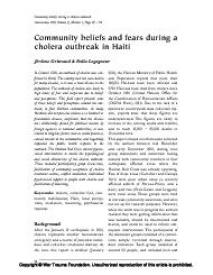Community beliefs and fears during a cholera outbreak in Haiti
In October 2010, an outbreak of cholera was confirmed in Haiti. The country had not seen cholera for many decades, so it was a ‘new’ disease to the population. The outbreak of cholera also leads to high levels of fear and suspicion due to beliefs and perceptions. This field report presents some of those beliefs and perceptions around the outbreak, in four Haitian communities. As many Haitians did not perceive cholera as a ‘natural’ or preventable disease, suspicions that the disease was deliberately spread for political reasons by foreign agencies or national authorities, or was related to religious factors such as vodou practices, caused tension in the communities and negatively impacted the public health response to the outbreak. The Haitian Red Cross started psychosocial interventions to tackle the psychological and social dimensions of the cholera outbreak. These included participatory group discussions, facilitation of community acceptance of cholera treatment centres, conflict mediation, individual psychosocial support to people with cholera and facilitation of mourning
Geachte bezoeker,
De informatie die u nu opvraagt, kan door psychotraumanet niet aan u worden getoond. Dit kan verschillende redenen hebben,
waarvan (bescherming van het) auteursrecht de meeste voorkomende is. Wanneer het mogelijk is om u door te verwijzen naar de bron
van deze informatie, dan ziet u hier onder een link naar die plek.
Als er geen link staat, kunt u contact opnemen met de bibliotheek,
die u verder op weg kan helpen.
Met vriendelijke groet,
Het psychotraumanet-team.
Reference:
Jéröme Grimaud, Fedia Legagneur | 2011
In: Intervention: the international journal of mental health, psychosocial work and counselling in areas of armed conflict, ISSN 1571-8883 | 9 | 1 | 26-34
http://www.interventionjournal.com/sites/default/files/Grimaud%20%26%20Legagneur.pdf
In: Intervention: the international journal of mental health, psychosocial work and counselling in areas of armed conflict, ISSN 1571-8883 | 9 | 1 | 26-34
http://www.interventionjournal.com/sites/default/files/Grimaud%20%26%20Legagneur.pdf


